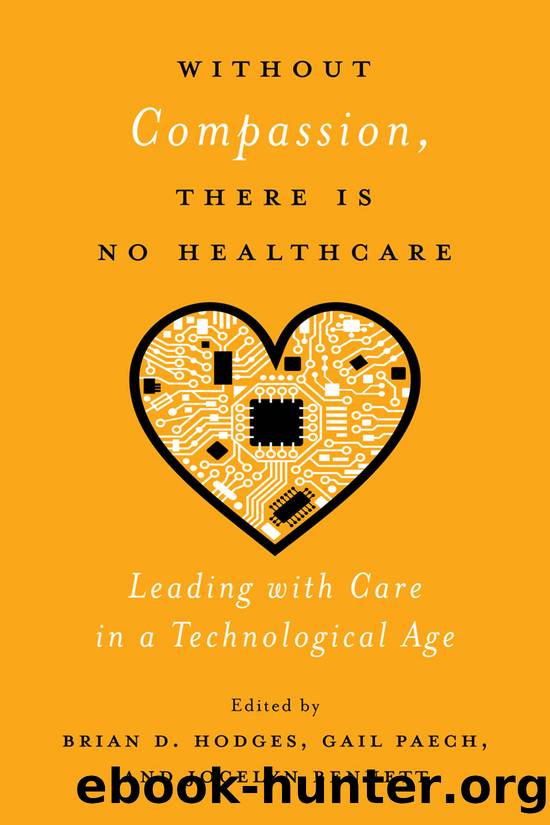Without Compassion, There Is No Healthcare by Brian D. Hodges

Author:Brian D. Hodges
Language: eng
Format: epub
Publisher: McGill-Queen's University Press
Published: 2020-10-20T00:00:00+00:00
5
Compassion and
Health Professional Education
Claire Mallette, Donald Rose, and Michelle Spadoni
As authors, we are mid- to late-career associate professors teaching future health practitioners in the academic setting. We have been invited to write this chapter on emerging technologies in healthcare and their educational implications. Herein, we will explore the turbulence that advancing technology will generate across educational domains and within practice settings. As educators, we must not only enable learners to use emerging technologies â often while acquiring those skills ourselves â but also equip them to assess the various effects of those technologies in practice to ensure compassion is sustained. This challenge requires new knowledge and technical skills, as well as new identities and adaptable forms of expertise for our future health professionals to become curious, compassionate practitioners.
Our students have come of age in a world of ubiquitous technologies. Yet, we are of the Jetsonsâ generation. Seeds of AI were planted in our imaginations through a quirky technological cartoon created by Hanna-Barbera in the 1960s. The television show introduced our generation to moving sidewalks, laptops, rockets, and watches that monitored essential life forces. The Jetson family seamlessly interfaced with technology by doing everyday activities, such as chatting with their digital doctor, and interacting with Rosie the home android to add milk to the grocery order, which was then delivered by a flying drone to their doorstep. These items were strange futuristic ideas to us at the time; now, we can describe many of them with realistic names.
The futuristic world of the Jetsons was amplified in our memories in the summer of 1967, when Canada hosted Expo 67 in Montreal. The rail trams zooming by overhead, circling around the glass-globed America Pavilion, convinced an entire generation that technologies for the home, workspace, and health system would be the next intellectual revolution. The exhibition theme, âMan and His World,â derived from Terre des Hommes by poet and aviator Antoine de Saint-Exupéry, was transformative for our generation through quotes such as, âIt is the compelling zest of high adventure and of victory, and in creative action, that man finds his supreme joysâ (de Saint-Exupéry 1950, 86).
Our generation was witness to the first organ transplants and the first man to walk on the moon. We used the first hand-held calculators and were introduced to computer hard drives that filled entire storage rooms. We remember when a cellphone was the size of a brick and weighed that much. While we dreamed of the possibilities that came in the National Aeronautics and Space Administration (NASA) era, the following generations developed the science that made possible Facebook, Instagram, Google, tablets, robotics, and the Human Genome Project.
Every new development brings the unknown and unforeseeable. Emergent technologies continue to deliver inconceivable opportunities, such as decision-making algorithms, surgical robots, and beyond. However, we must also be mindful of intended and unintended consequences that emerging technologies will have in the future, such as privacy breaches that seem beyond our view and the risk of losing the human connection in healthcare.
This is the terrain that we navigate as health profession educators.
Download
This site does not store any files on its server. We only index and link to content provided by other sites. Please contact the content providers to delete copyright contents if any and email us, we'll remove relevant links or contents immediately.
| Administration & Medicine Economics | Allied Health Professions |
| Basic Sciences | Dentistry |
| History | Medical Informatics |
| Medicine | Nursing |
| Pharmacology | Psychology |
| Research | Veterinary Medicine |
Machine Learning at Scale with H2O by Gregory Keys | David Whiting(4313)
Fairy Tale by Stephen King(3398)
Will by Will Smith(2920)
Hooked: A Dark, Contemporary Romance (Never After Series) by Emily McIntire(2554)
Rationality by Steven Pinker(2364)
Friends, Lovers, and the Big Terrible Thing by Matthew Perry(2230)
The Becoming by Nora Roberts(2202)
Love on the Brain by Ali Hazelwood(2078)
A Short History of War by Jeremy Black(1848)
HBR's 10 Must Reads 2022 by Harvard Business Review(1844)
The Strength In Our Scars by Bianca Sparacino(1843)
A Game of Thrones (The Illustrated Edition) by George R. R. Martin(1745)
Leviathan Falls (The Expanse Book 9) by James S. A. Corey(1744)
515945210 by Unknown(1667)
Bewilderment by Richard Powers(1620)
443319537 by Unknown(1559)
The 1619 Project by Unknown(1462)
The Real Anthony Fauci: Bill Gates, Big Pharma, and the Global War on Democracy and Public Health (Childrenâs Health Defense) by Robert F. Kennedy(1408)
All About Love: New Visions by bell hooks(1351)
